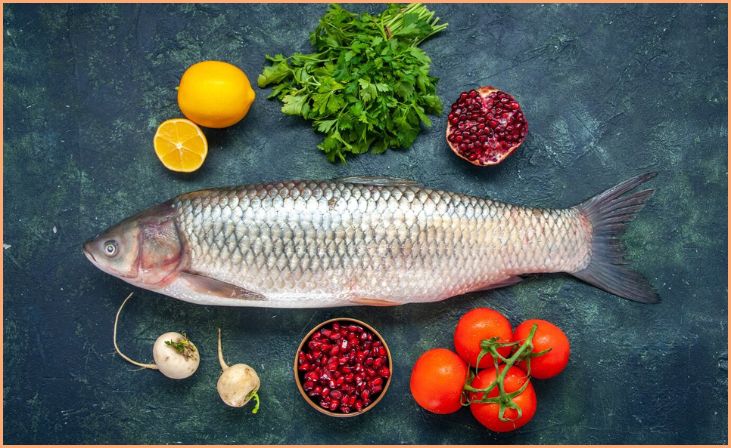Maintaining good mental health involves a holistic approach that includes not only psychological well-being but also attention to physical health, including diet. Certain foods have been found to support mood and help combat symptoms of mania and depression. In this blog post, we will explore nine top foods that can positively impact mood and provide important nutrients for mental health. The connection between what we eat and how we feel is profound, and certain foods have been identified for their mood-boosting properties
From omega-3 fatty acids found in fatty fish to the mood-stabilizing effects of dark chocolate, we will discuss the science behind these foods and how they can contribute to a balanced and uplifted mood. By incorporating these foods to support mood into your diet, you can take proactive steps toward supporting your mental well-being.
Best Foods to Support Mood Instantly
Emerging research suggests that certain foods can play a role in supporting mood and potentially alleviating symptoms of mania and depression. In this article, we’ll delve into a list of nine foods that are believed to have positive effects on mental well-being. Incorporating these foods into your diet may contribute to a healthier mind and improved mood.
Fatty Fish

Indulging in fatty fish, like salmon and mackerel, offers more than just a flavorful meal. These fish are rich sources of omega-3 fatty acids, essential for supporting both brain health and mood regulation. Omega-3s play a pivotal role in maintaining the structural integrity of brain cells and promoting the synthesis of neurotransmitters involved in mood control, such as serotonin and dopamine. Research suggests a potential link between omega-3 intake and lower rates of depression, making these fatty acids a valuable addition to a mood-boosting diet.
Incorporating fatty fish into your meals not only provides a delicious dining experience but also contributes to a nutrient-rich approach to supporting mental well-being.
Quick Link: What Temp Should Chicken Be Cooked To Make it Juicy And Safe?
Nuts and Seeds
Embracing the crunch of nuts and seeds, particularly walnuts and flaxseeds, not only treats your taste buds but also provides a nutritional boost for your mood. Packed with omega-3 fatty acids and an array of essential nutrients, these wholesome snacks play a role in supporting mental well-being. Omega-3s, renowned for their brain-boosting properties, are present in abundance, promoting optimal brain function and potentially reducing the risk of mood disorders.
The vitamins and minerals found in nuts and seeds further contribute to the overall health of the brain, making them a delightful and nutritious addition to your daily diet. Whether enjoyed as a snack or incorporated into meals, walnuts, and flaxseeds stand out as flavorful allies in the pursuit of better mental and emotional balance.
Dark Leafy Greens
Delight your palate with the vibrant goodness of dark leafy greens, such as spinach and kale, and simultaneously nurture your mood. Abundant in folate and antioxidants, these greens offer a powerful combination of nutrients that play a vital role in mood regulation. Folate, a prominent B vitamin found in spinach and kale, is known for its essential contributions to maintaining emotional well-being. Beyond their mood-enhancing properties, these greens pack a nutritional punch with a range of important nutrients that benefit overall health.
The antioxidants present in spinach and kale further amplify their impact, providing a holistic approach to supporting both physical and mental well-being. Whether tossed into salads, sautéed as a side, or blended into smoothies, incorporating dark leafy greens into your diet is a flavorful and nutritious strategy for nurturing a positive mood.
Berries
Embark on a flavorful journey with berries, like the vibrant blueberries and succulent strawberries, as they become not just a delightful treat for your taste buds but also champions for your mental well-being. Bursting with antioxidants and essential vitamins, berries play a crucial role in safeguarding cells from oxidative stress, a factor linked to mental health concerns. The colorful array of antioxidants found in these berries acts as a shield, offering protection and support for your overall mental wellness.
The regular inclusion of berries in your diet isn’t just a culinary pleasure; it’s a mindful choice with potential protective effects on your mental health. Whether enjoyed as a refreshing snack, blended into smoothies, or sprinkled atop yogurt, berries offer a delectable way to contribute to your holistic well-being.
Whole Grains

Embark on a journey towards mood stability with the inclusion of whole grains like quinoa and brown rice in your diet. These nutritional powerhouses offer a source of complex carbohydrates, playing a pivotal role in stabilizing blood sugar levels. The steady release of energy from complex carbohydrates helps maintain a balanced mood, preventing the fluctuations often associated with energy crashes. By choosing whole grains, you provide your body with sustained energy, promoting a sense of well-being throughout the day.
Whether incorporated into nourishing bowls, side dishes, or as the foundation of a wholesome meal, quinoa, and brown rice contribute not only to your physical health but also play a vital role in supporting your mental equilibrium. Elevate your mood and energy levels by embracing these wholesome grains as a cornerstone of your nutrition.
Also Read: Can You Fry Chicken Without Flour: Try These Substitutes!
Lean Proteins
Elevate your mood and support mental well-being by incorporating lean proteins such as chicken, turkey, and beans into your diet. These protein sources provide a rich supply of amino acids, the fundamental building blocks of neurotransmitters. Neurotransmitters play a crucial role in transmitting signals within the brain, influencing mood and emotional stability. By ensuring an adequate intake of these lean proteins, you contribute to the production and balance of neurotransmitters, fostering a harmonious communication system in your brain.
Whether enjoying a grilled chicken breast, a savory turkey dish, or incorporating beans into a wholesome meal, these protein-rich options offer not only delicious flavors but also essential nutrients for your mental health. Make a conscious choice to include these lean proteins in your diet, nurturing both your body and mind for a more balanced and positive outlook on life.
Yogurt and Fermented Foods
Nourish your gut and potentially boost your mood by incorporating yogurt and fermented foods like sauerkraut and kimchi into your diet. These foods are rich in probiotics, beneficial bacteria that contribute to a healthy gut environment. Recent research has unveiled a fascinating connection between gut health and mental well-being, emphasizing the importance of the gut-brain axis. Probiotics play a role in this axis, influencing the communication between the gut and the brain. By promoting a balanced and thriving gut microbiome, probiotics may positively impact mood regulation.
Include a serving of yogurt or fermented delights in your daily meals to not only support your gut health but also explore the potential benefits for your mental and emotional equilibrium.
Avocado
Elevate your brain health and potentially influence your mood with the nutrient-rich avocado. Packed with healthy fats, avocados provide essential support for optimal brain function. The fats present in avocados, including omega-3 fatty acids, contribute to cognitive well-being and may play a role in mood regulation. Beyond fats, avocados offer a wealth of vitamins and minerals that contribute to overall health. Rich in nutrients such as vitamin K, vitamin E, vitamin C, and various B vitamins, avocados serve as a comprehensive source of nourishment.
By incorporating this creamy fruit into your diet, you not only indulge in its delicious flavor but also provide your body with the building blocks for a healthy brain and potentially positive mood outcomes.
Dark Chocolate

Indulge in the rich and satisfying taste of dark chocolate, a treat that goes beyond pleasure by offering potential mood-boosting benefits. Moderation is key, as dark chocolate contains antioxidants and compounds that contribute to feelings of well-being. The presence of a small amount of caffeine adds to its allure, providing a mild energy boost that can enhance mood without the jitters associated with higher caffeine content.
Dark chocolate’s unique combination of flavor and nutritional compounds makes it more than just a sweet treat; it becomes a delightful addition to your diet that may positively impact your emotional state. So, savor the goodness of dark chocolate responsibly and experience the subtle joys it can bring to both your taste buds and your mood.
While food alone cannot replace professional treatment for mania and depression, the role of diet in supporting mental well-being should not be underestimated. Incorporating a variety of nutrient-rich foods like fatty fish, nuts, dark leafy greens, berries, whole grains, lean proteins, yogurt, avocado, and dark chocolate into your diet may contribute to a healthier mind and improved mood. Always consult a healthcare provider for personalized guidance.
Final Words
In conclusion, the foods we consume can have a significant impact on our mood and mental health. Incorporating nutrient-rich foods into our diet can help combat symptoms of mania and depression and promote overall well-being. The nine foods discussed in this blog post, including fatty fish, leafy greens, whole grains, berries, nuts and seeds, fermented foods, dark chocolate, turmeric, and green tea, offer a range of important nutrients and compounds that support mental health.
However, it’s important to remember that diet alone cannot replace professional treatment for mental health conditions. If you or someone you know is struggling with mental health issues, it’s important to seek appropriate medical advice and support.
FAQs
Certain foods contain nutrients that play a role in the production of neurotransmitters, such as serotonin and dopamine, which are linked to mood regulation. Additionally, they can impact inflammation and overall brain health.
While diet alone may not be the sole solution, it can complement other strategies in managing mood disorders. A balanced and nutrient-rich diet supports overall well-being and may positively influence mental health.
Highly processed foods, excessive sugar, and refined carbohydrates may negatively impact mood. It’s advisable to focus on whole, nutrient-dense foods and limit the intake of substances like caffeine and alcohol.
The impact of dietary changes on mood can vary from person to person. While some may experience relatively quick effects, others may notice changes over a more extended period. Consistency in making healthy food choices is key.







